As the start of the school year approaches in Florida, some teachers say chaos and confusion have marked the days leading up to reopening as they navigate how to teach under new state policies. Teachers say they are going into classrooms less confident about their lesson plans, confused about changes to state laws and on high alert that once-benign instructions could now get them fired or charged with felonies.
“I don’t know how to approach the year,” said Richard Judd, a social studies teacher at Nova High School in Broward County. “There’s a lot of different ways you can get in trouble. And that’s what’s so insidious about these policies.”
Mayade Ersoff, 61, who teaches civics and world history at Palmetto Middle School, said she had not had any guidance from the school’s principal or Miami-Dade Public Schools about recent decisions that have made national headlines, such as the state’s new African American history standards for K-12 students, which include instruction that enslaved people benefited from skills that they learned.
“It’s very unsettling,” Ersoff said.
Judd, 52, said he was unsure whether his school district had even had time to “digest” any of the changes.
“I don’t know that anybody has any guidance, because so many of these things came out so recently,” Judd said. “They came out within weeks of the school year, which is what really makes them so disruptive.”
Some teachers said they were holding out hope that a meeting scheduled for the day before school starts in the coming days would help clear up their confusion, even if it comes weeks after their curriculums had been finalized.
The new laws and policies change how schools teach African American history and topics involving LGBTQ people, among other things.
In recent weeks, Florida was accused of effectively banning the College Board’s Advanced Placement Psychology classes because of its sexuality and gender content. The state Education Department said the course can be taught in its “entirety in a manner that is age and developmentally appropriate” — an explanation that some teachers said was borrowed from legislation that is anti-LGBTQ and intentionally vague — leaving teachers vulnerable to attacks from parents and conservative politicians alike. Amid the confusion, several districts said they would stop offering the longtime course.

